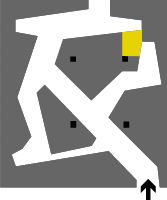Novak Oparušić 1909 - 1944 Edit
Born 7.7.1909 in Donji Petrovci
Died 25.7.1944 in Linz
Biography
Novak Oparušić was born as son of Zorka and Despot Oparušić in the village of Donji Petrovci in Vojvodina, Serbia, a little village of around 1.000 inhabitants, mostly farmers. His family had quite some fertile land where they cultivated fruit, grain, corn and vegetables. They also had a large stock of domestic animals: horses, oxen, cows, pigs, geese and chicken. The Oparušić family was a well-off family. A few generations lived together in a spacious house with a large sunny courtyard and a shadowy terrace with flowers where the family traditionally had their Sunday meal during the warm days. They were also one of the few in the village that had, for that time, modern agricultural equipment.
People remember Novak as a positive person, someone who always looked at the bright side of life. He worked hard as a farmer from early morning till late afternoon, but after a day of hard work loved to socialise and play cards with his friends in the only Kafana (tavern) in the village.
Novak must have been just over 20, when he fell in love with a smart and pretty girl living at the other side of the village, Kristina Jekić. They got married and were blessed with a son Savo and a daughter Drena.
Novak was arrested by the SS troops at the age of 34, on January 1943 together with his father Despot, his uncle Mladen, his nephew Ilija and around 20 other male members of the family. The entire male population found in the village that black day, around 200 people, was captured as a repression for a partisan attack on the nearby railway. The villagers were first deported to the concentration camp Staro Sajmište in Serbia. After several days the healthiest, around 100 of them, of which 12 from the Oparušić family, were deported to Mauthausen, where they arrived on 2 February 1943.
I was able to roughly reconstruct Novak’s days between his arrival to Mauthausen and the day of his death, based on the stories of the survivors, and above all thanks to the excellent support from Mauthausen Gedenkstaette.
Novak, who was a peaceful family man, a farmer, was categorized as a “Schutzhäftling” (‘prisoner in protective custody’). The “Schutzhaft” was at that time a forced measure against persons who were supposed to pose a ‘threat to the security of the people and the state’.
On 20 February 1943, so just over two weeks after arriving at Mauthausen’s main camp, Novak was transferred to subcamp Linz III. Prisoners in this subcamp were forced to work in the construction of underground factories and later on to work in these factories that produced steel parts for weapon industry.
A description of Linz III subcamp on the Mauthausen Gedenkstaette site: “The camp is overcrowded; the provision of food and the sanitary conditions are completely inadequate. The use of violence by guards and civilian foremen is the order of the day. The prisoners are housed in the former No. 54 Forced Labour Camp on the flood plain of the Traun. The barrack camp is often flooded.”
With his positivism, will for survival, will to see his family and friends again, or something else for which I cannot find words, but which inspires me tremendously, Novak managed to survive all those horrors for a year and a half.
Ironically, he was killed during the Allied air raids on 25 July 1944. His body was never identified and he was reported missing, not dead, but missing, together with other 95 prisoners that day.
We have learned about the very last minutes of his life thanks to Mr. Živan Jekić, Novak’s best man who was working together with Novak in the steel factory and who survived the camp. Živan told us that it was a touch of faith. When the bombing started, Novak and Živan found themselves with a group of several other fellows stuck in one corner of the factory. Bombing was very heavy, and Novak suggested that the group split, to increase the chance that someone survives. So, they did. Živan and Novak split. Novak and a few other people, among which, Mr. Milenko Čvorkov, a school friend from the same village of Donji Petrovci, left to the other side of the factory.
Several seconds after Novak’s group moved, a bomb fell precisely on this place. Everyone was killed in front of Živan’s eyes.
Novak’s daughter, Drena, remembers well that day in June of 1945, she had just turned 8. The survivors were returning by train to the same railway station where partisan riot took place early 1943. She stood there excited in her best dress with her brother and mother, flowers in her hand, but her father did not come back.
Tatjana Claasen Vujčić, granddaughter
